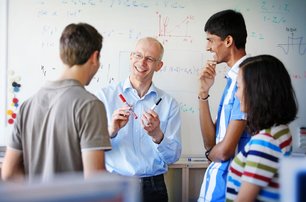
The IMPRS for Quantum Dynamics and Control (QDC) is devoted to PhD training for Quantum Science in a broad sense, encompassing the fields of Atomic and Chemical Physics, Condensed Matter, Information Science and Quantum Optics to advance our understanding and controllability of the quantum world.
The IMPRS-QDC is hosted by the Max Planck Institute for the Physics of Complex Systems (MPI-PKS) in Dresden and has strong links to the TU Dresden and other institutions in Dresden, as well as in Prague and Wroclaw, attractive academic locations in the close by countries of Czech Republic and Poland.
Furthermore, our IMPRS is part of the network of about sixty International Max Planck Research Schools in Germany.
They provide an outstanding research environment for PhD students across the sciences under the auspice of the Max Planck Society.
The about sixty students of our Research School are based in the groups of their advisors at the respective partner institutions. Apart from individual collaborations, they come together and create the spirit of the School through monthly seminars, workshops, summer schools and an annual retreat. Further training is provided through lecture courses offered by the participating institutions and in particular by lectures from our own faculty members. We also offer career talks mostly by alumni of the School and opportunities to improve soft skills.
Prospective students can apply twice a year with deadlines at the end of April and October.
Our two main, also overlapping research thrusts are (i) the dynamics of few to many-body systems interacting with an environment and (ii) their control towards effective use for quantum information and other purposes.
Fundamental questions addressed regarding (i) include emergent collective phenomena in Rydberg atomic ensembles, solid state materials embedded in optical cavities, or in exotic quantum phases under (periodic) driving.
Relevant topics of quantum control (ii) include state-to-state manipulation of quantum systems and the mitigation of environmental effects with the goal of new research possibilities in experimentally challenging regimes, such as the development of quantum simulators and ultimately quantum computers.
A brief guide to the research interests of our faculty members may be found here and links to their home pages here.
Each faculty member typically offers PhD projects at each application call.